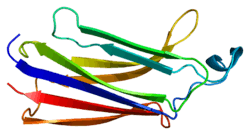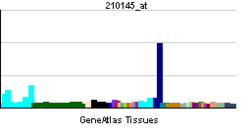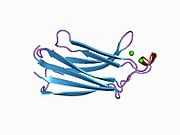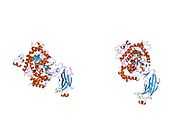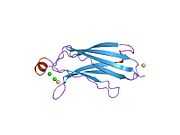PLA2G4A
Cytosolic phospholipase A2 is an enzyme that in humans is encoded by the PLA2G4A gene.[1][2]
Function
This gene encodes a member of the cytosolic phospholipase A2 group IV family. The enzyme catalyzes the hydrolysis of membrane phospholipids to release arachidonic acid which is subsequently metabolized into eicosanoids. Eicosanoids, including prostaglandins and leukotrienes, are lipid-based cellular hormones that regulate hemodynamics, inflammatory responses, and other intracellular pathways. The hydrolysis reaction also produces lysophospholipids that are converted into platelet-activating factor. The enzyme is activated by increased intracellular Ca2+ levels and phosphorylation, resulting in its translocation from the cytosol and nucleus to perinuclear membrane vesicles.[2]
Interactions
PLA2G4A has been shown to interact with HTATIP.[3]
Clinical signficance
Mutations in this gene have been associated with multifocal stenosing ulceration of the small intestine.[4]
References
- ↑ Dennis EA (Jun 1994). "Diversity of group types, regulation, and function of phospholipase A2". J Biol Chem 269 (18): 13057–60. PMID 8175726.
- ↑ 2.0 2.1 "Entrez Gene: PLA2G4A phospholipase A2, group IVA (cytosolic, calcium-dependent)".
- ↑ Sheridan AM, Force T, Yoon HJ, O'Leary E, Choukroun G, Taheri MR, Bonventre JV (July 2001). "PLIP, a novel splice variant of Tip60, interacts with group IV cytosolic phospholipase A(2), induces apoptosis, and potentiates prostaglandin production". Mol. Cell. Biol. 21 (14): 4470–81. doi:10.1128/MCB.21.14.4470-4481.2001. PMC 87107. PMID 11416127.
- ↑ Brooke MA, Longhurst HJ, Plagnol V, Kirkby NS, Mitchell JA, Rüschendorf F, Warner TD, Kelsell DP, Macdonald TT (December 2012). "Cryptogenic multifocal ulcerating stenosing enteritis associated with homozygous deletion mutations in cytosolic phospholipase A2-α". Gut 63: 96–104. doi:10.1136/gutjnl-2012-303581. PMID 23268370.
Further reading
- Schröder HC, Perovic S, Kavsan V et al. (1998). "Mechanisms of prionSc- and HIV-1 gp120 induced neuronal cell death". Neurotoxicology 19 (4–5): 683–8. PMID 9745929.
- Hirabayashi T, Murayama T, Shimizu T (2005). "Regulatory mechanism and physiological role of cytosolic phospholipase A2". Biol. Pharm. Bull. 27 (8): 1168–73. doi:10.1248/bpb.27.1168. PMID 15305015.
- Law MH, Cotton RG, Berger GE (2006). "The role of phospholipases A2 in schizophrenia". Mol. Psychiatry 11 (6): 547–56. doi:10.1038/sj.mp.4001819. PMID 16585943.
- Shimizu T, Ohto T, Kita Y (2006). "Cytosolic phospholipase A2: biochemical properties and physiological roles". IUBMB Life 58 (5–6): 328–33. doi:10.1080/15216540600702289. PMID 16754327.
- Sharp JD, White DL, Chiou XG et al. (1991). "Molecular cloning and expression of human Ca(2+)-sensitive cytosolic phospholipase A2". J. Biol. Chem. 266 (23): 14850–3. PMID 1869522.
- Clark JD, Lin LL, Kriz RW et al. (1991). "A novel arachidonic acid-selective cytosolic PLA2 contains a Ca(2+)-dependent translocation domain with homology to PKC and GAP". Cell 65 (6): 1043–51. doi:10.1016/0092-8674(91)90556-E. PMID 1904318.
- Tay A, Simon JS, Squire J et al. (1995). "Cytosolic phospholipase A2 gene in human and rat: chromosomal localization and polymorphic markers". Genomics 26 (1): 138–41. doi:10.1016/0888-7543(95)80093-2. PMID 7782073.
- Wu T, Ikezono T, Angus CW, Shelhamer JH (1995). "Characterization of the promoter for the human 85 kDa cytosolic phospholipase A2 gene". Nucleic Acids Res. 22 (23): 5093–8. doi:10.1093/nar/22.23.5093. PMC 523783. PMID 7800505.
- Miyashita A, Crystal RG, Hay JG (1995). "Identification of a 27 bp 5'-flanking region element responsible for the low level constitutive expression of the human cytosolic phospholipase A2 gene". Nucleic Acids Res. 23 (2): 293–301. doi:10.1093/nar/23.2.293. PMC 306668. PMID 7862535.
- Morri H, Ozaki M, Watanabe Y (1995). "5'-flanking region surrounding a human cytosolic phospholipase A2 gene". Biochem. Biophys. Res. Commun. 205 (1): 6–11. doi:10.1006/bbrc.1994.2621. PMID 7999086.
- Sharp JD, Pickard RT, Chiou XG et al. (1994). "Serine 228 is essential for catalytic activities of 85-kDa cytosolic phospholipase A2". J. Biol. Chem. 269 (37): 23250–4. PMID 8083230.
- Lin LL, Wartmann M, Lin AY et al. (1993). "cPLA2 is phosphorylated and activated by MAP kinase". Cell 72 (2): 269–78. doi:10.1016/0092-8674(93)90666-E. PMID 8381049.
- Flati V, Haque SJ, Williams BR (1996). "Interferon-alpha-induced phosphorylation and activation of cytosolic phospholipase A2 is required for the formation of interferon-stimulated gene factor three". EMBO J. 15 (7): 1566–71. PMC 450066. PMID 8612580.
- de Carvalho MG, McCormack AL, Olson E et al. (1996). "Identification of phosphorylation sites of human 85-kDa cytosolic phospholipase A2 expressed in insect cells and present in human monocytes". J. Biol. Chem. 271 (12): 6987–97. doi:10.1074/jbc.271.12.6987. PMID 8636128.
- Freed KA, Moses EK, Brennecke SP, Rice GE (1997). "Differential expression of type II, IV and cytosolic PLA2 messenger RNA in human intrauterine tissues at term". Mol. Hum. Reprod. 3 (6): 493–9. doi:10.1093/molehr/3.6.493. PMID 9239738.
- Mavoungou E, Georges-Courbot MC, Poaty-Mavoungou V et al. (1997). "HIV and SIV envelope glycoproteins induce phospholipase A2 activation in human and macaque lymphocytes". J. Acquir. Immune Defic. Syndr. Hum. Retrovirol. 16 (1): 1–9. doi:10.1097/00042560-199709010-00001. PMID 9377118.
- Perisic O, Fong S, Lynch DE et al. (1998). "Crystal structure of a calcium-phospholipid binding domain from cytosolic phospholipase A2". J. Biol. Chem. 273 (3): 1596–604. doi:10.1074/jbc.273.3.1596. PMID 9430701.
- Börsch-Haubold AG, Bartoli F, Asselin J et al. (1998). "Identification of the phosphorylation sites of cytosolic phospholipase A2 in agonist-stimulated human platelets and HeLa cells". J. Biol. Chem. 273 (8): 4449–58. doi:10.1074/jbc.273.8.4449. PMID 9468497.
| |||||||||||||
